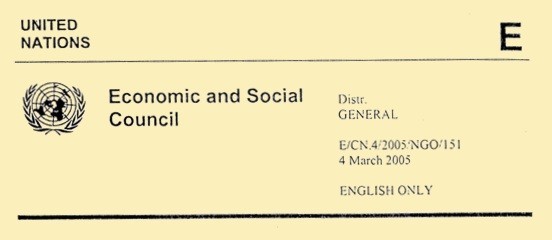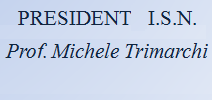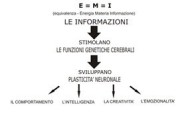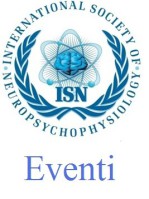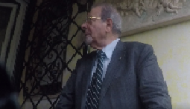HUMAN RIGHTS AND THE GENETIC DRIVES OF
THE HUMAN BEING
by
Michele Trimarchi
Human physiology demonstrates that, at drive level, basic human rights are encoded in the human genome that gives live to the individual. Every human being on our planet, wherever he/she is born, has the possibility to develop awareness and conscience of his/her dignity, of the value of freedom, of the sense of justice, and of the search for pleasure, that must be transformed into love for him/herself and for every existing form of life.
If we don’t understand deeply human rights and don’t live them within ourselves, we cannot either respect them in others or communicate their values to others.
In human rights we find the basic values of human beings. It is only ignorance of such values that makes it possible to violate human rights. In most cases children’s rights have been violated since birth. Therefore children develop their defences and their strategies in order to make these human rights, i. e., their basic fundamental drives, established and affirmed. Out of the environment, out of family, of society and culture, they start to understand the meaning of freedom, of dignity, of justice, of love, and this is linked to the cultural evolution of peoples.
And yet we should not forget that the foundations of human personality are the same in every people of the Earth: the drives giving life to human beings are universal both in women and in men respecting their physiological differences. Therefore wisdom depends not on race, nor on sex, nor on skin colour.
We are now going to very synthetically analyse these drives and the educational principles syntonic with the fundamental values modulating the awareness of human beings.
DIGNITY
The value of dignity, acknowledged by the Universal Declaration of Human Rights, represents the value of life itself, which lasts for the whole span of existence, and is independent from behavior. Dignity is inherent in the human being just by the very fact that he/she biologically exists. Human dignity should not be mixed up with social dignity, which is linked both to the activity performed within society and to the implementation of special works of social and cultural utility and so on. This is a fundamental distinction: while social dignity is acquired in the span of life and depends on the social, cultural, and political context, human dignity as the value of life is inborn and untouchable, has an infinite value, cannot be sold, has no space or time limitations, and cannot be reduced or increased. Dignity, as life itself, is sacred because it was not planned or realized by man, but is a value that every human being finds inside him/herself at birth. The Universal Declaration Of Human Rights recognizes equal dignity to every man and woman on Earth. And human dignity cannot and must never be questioned by anyone. Instead it has to be loved and respected.
FREEDOM
Potentially each human being right from its birth is seeking freedom because it is a genetic, physiologic, and universal drive.
But then it is the environment, the family, the society, and the State that will determine the degree of freedom that will be granted to that person during his/her lifetime. And this, of course, takes place through so-called education.
Let us reflect now for a while on an education that takes into account the fundamental human rights. If the political system creates education on the basis of the fundamental human values, we will have wise men already at fifteen years of age, because we would allow this drive for freedom to acquire conscience and awareness and to be managed by the conscious self of the human being and not by the political forces or by the laws that must affirm or limit human behavior, but by the conscious ego of the person who, recognizing certain universal values per se, uses them to act, to think, and to create, to plan own actions and life in his relationship with others. This is the key for a social regeneration that respects fundamental human rights of women and men.
Therefore freedom is a drive arising in the child that than must be guided towards full expression within the environment in which the child is born and must move within the space where he lives, in respect of himself and others. This of course requires that the aware of them and of the appropriate pedagogical method that should foster this process of evolution: in the conscience of him/herself as well as of the limits imposed by the environment in which the child (and then the adult) is free to act. In this evolutionary process we must take into account that an appropriate growth of conscience must correspond to the biological growth.
For this reason, we must prepare educators: without such tools will be no education for human rights, we will speak only for a method to spread notions, schemes, and patterns to verify macro-violations of human rights, while in the substance human rights will again be violated. Only respect for human rights abolishes conflicts and produces awareness and conscience, the absolute condition for a real and concrete freedom.
JUSTICE
Justice guided by the fundamental values of the Universal Declaration does not yet exist within States. Justice should give conscience to the individual and fosters his evolution in the development of the ability to manage and solve intra and interpersonal conflicts in the respect of his/her and others’ dignity.
The purpose of life for a person is to have this evolution of his/her conscience. To enrich one’s own conscience increases wisdom in the individual, provided that this individual acquires the tools to be just. This justice must use universal measurement tools, must be valid or everybody, and will be so whenever he/she measures his/her own behavior on the basis of the fundamental values that are written in the Universal Declaration of Human Rights. Therefore the concept of justice undergoes an evolution within society based on the evolution of systems adopted by the government and by the politicians of the same country.
No one can acquire a freedom that goes beyond the law within a state, because the law is for all citizens, and – if it is not just – we have to change it. If in a democracy the law foresees, for instance, the death penalty, this law can be changed through the rise of the awareness of most citizens that the death penalty is a legalized killing more serious than a killing made by a citizen, as it is the state’s duty to educate people to respect everyone’s fundamental rights. We must therefore change the law and by changing the law we’ll enable all citizens to evolve, to acquire a better view of what is justice. This produces evolution of humankind and of the human conscience.
Our story tells us where we started from: today, when we measure ourselves against such values, we can say: well we have reached this point, or that point, and we can understand where we want to go. But it is up to us to decide where we want to go. Undoubtedly, if we are here, we want to rule out and remove all the obstacles that prevent the human rights to life, to do away with all blocks set against freedom. We must decide to create societies that guarantee justice for all, when everybody can freely move, and have food, water, air, and an environment for equal opportunities, but where everybody – and this is fundamental – must be able to think on the basis of these universal values, or else there always will be wars and conflicts. At a substantial level, the conflicts within families do not differ from the conflicts arising among nations. Micro or macro-violations are regulated by the same mechanisms. It is the deep meaning of these values that we have to know, understand, and live to make a conscience of fundamental human rights develop in ourselves, and to be able to teach in our turn how to apply and live these values.
The way is always education, which must stimulate and foster the development and expression of the possibilities existing within the human brain. This is what will foster and favour the joy of living.
Education, without blaming anybody, should lead to reflection on what is just and useful for the human being. Substantively speaking, nothing will be helpful or useful or just if its usefulness and justice deny others’ rights.
PLEASURE – LOVE
The principle of pleasure is a fundamental value, which is absolutely necessary for the growth and development of the person. It is so important that it creates the foundations of the personality.
It is therefore basically important to “enwrap” the child with love, with warmth, with positive emotions at birth, because it is in the first two years of life that the foundations of the future of one’s personality are created. During that period, the right hemisphere of the brain is fully developing and measures the field of force of energies that are transmitted to the child, and the warmth, the love, the harmony are forms of energy. The child is perfectly able to distinguish what is harmonic from what is not harmonic, what makes the brain react and what relaxes, favours and harmonises the brain.
Pleasure must gradually became love. The word “love” says little if it is not associated with the corresponding emotion that makes us feel whether it is or it is not love that we feel, the emotion we have inside ourselves. Now, when the child feels pleasure, when he is close to his mother who is nestling him and makes him reverberate, this is love on the part of the mother and pleasure on the part of the child. The child reverberates since he is the subject who is receiving something that he will then transmit again. A child who receives love, that is respected and favoured in expressing his basic drives, will certainly develop a conscience and a behaviour permeated by this love that is syntonic with the fundamental values of the person.
In synthesis, love is already in the child but to became capable of willfully creating love, he must develop the ability to decide that he wants to love, that he wants to think, that he wants to create with justice. This is possible through an educational process gradually driving the child to experience with criticism and self-criticism based on the fundamental values of human rights (dignity, freedom, justice, love), which can be recognized and identified by the higher functions of the human brain on the basis of the principle of objectivity and objectiveness, the result of the synergistic work of the two brain hemispheres. We verified all this in more than twenty years of integrated multidisciplinary studies through experiences showing how the brain, in special conditions, universally recognizes harmony and disharmony.
In conclusion, education must be based on the principles to shape children and young people who, growing up, may become citizens capable of applying and protecting human rights, whatever they are doing. This is the great “transformation” we need: it well be produced by the implementation of the values contained in the Universal Declaration of Human Rights, in which is integrated what great prophets or enlightened people in history have always tried to communicate.
Today, to do so, we have a science that confirms these values. Neuropsychophisiology eliminated the separation between mind and brain, noting the physical continuity of the various forms of energy of the environment stimulating and modulating the neuropsychophysiological development of the emotional, rational, creative behaviour, and how it is possible to develop a conscious Ego capable of managing and leading its knowledge, and its operational, evolutionary growth, i. e., its destiny. This knowledge produced an educational method that can be applied to every man and woman of the Earth to end the serious violations of the fundamental values of the person caused by ignorance of the physiology of the development of the conscience. At the present time humankind is subjected to the ignorance that produces conflict which, at different levels, destroys the quality of life by negative competition and fragments of pseudo-knowledge that deny the psychophysical and spiritual integrity of human beings.

